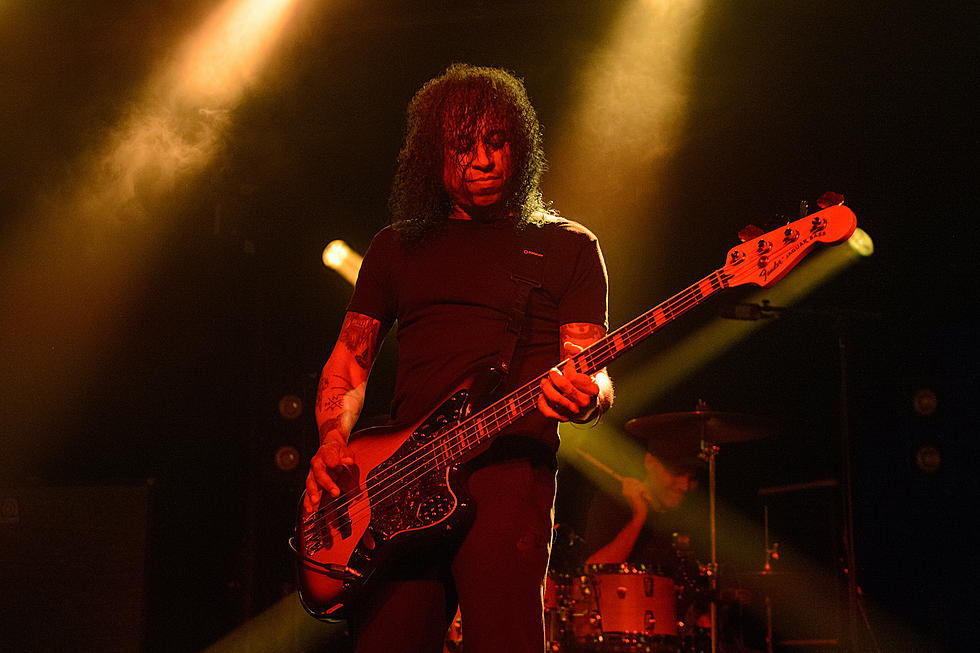
25 Years Ago: Quicksand’s ‘Slip’ Carved a New Path for Metal
By the early ‘90s, traditional metal and thrash had petered out and fans who were craving aggressive, angst-filled music turned to grunge and punk-pop. But, for those who craved a less radio-friendly, more underground sound, there a new crop of bands born from DIY hardcore and combining the raw fury of NYHC with the harsh riffs and bellicose vocals of more metallic bands like Prong and Helmet. One of the most influential groups from that scene was Quicksand, whose debut full-length Slip turns 25 on Feb. 9.
Quicksand’s acumen lay in its pedigree. Frontman Walter Schreifels played in New York hardcore bands Youth of Today and Gorilla Biscuits. At the same time, he and his bandmates – guitarist Tom Capone (Beyond), bassist Sergio Vega (Collapse) and drummer Alan Cage (Burn) – came from a generation that had as much passion for KISS, Judas Priest and Danzig as they did for Swans, Fugazi and Cro-Mags. As a result, Quicksand were able to retain their roots while expanding their sound to achieve a more bludgeoning and percussive vibe driven by staccato guitars, syncopated drums and feral, semi-tuneful vocals.
"We're definitely an amalgamation of all the aggressive stuff that's come out of New York, but we wanted to be a bit more cerebral,” Schreifels told me in 1993, shortly before Slip was released. “Aggressive music is great, but we want to make songs that have a point as well."
Like many of their peers, Quicksand were inspired by the cultural climate in which they grew up. They didn’t have any specific cures for their ills, but they sure knew what pissed them off, and they injected that belligerence into their aggressive music and confessional lyrics about broken homes, shattered dreams and dysfunctional relationships.
"I'm from a divorced family and so are half the people I know,” Schreifels said. “I think that says something about the whole American culture. There's this whole breakdown of the family in this country, and even though I don't buy into the whole [President George H.W. Bush-perpetuated] 'family values' bullshit, it does seem that people today are unable to stick together in an idealistic way, for some reason."
Quicksand formed in 1990, and the band articulated pre-millennial angst with its self-titled debut EP, which was driven by a combination of abrupt, jagged riffs, sustained, dissonant distorted guitar chords, discordant solos and barked vocals that sometimes approached the rhythmic cadence of rap.
“Hardcore and rap in New York was happening at the same time,” Schreifels told unitedbywalter.com. “Run-D.M.C. and all of those bands were happening. When I was into hardcore, Public Enemy, Eric B was all in New York. It seemed as though all the artists were coming out of New York, so it felt very connected to what our hardcore scene was about.”
Once Quicksand hit the scene, heavy alt-rock and experimental metal fans were quickly drawn to the group’s combustive music, which led to a major label deal with Polygram. This was an era when big record companies played an important role in creating marketing and promotional campaigns that could take underground bands to large audiences. Being connected with a major label enabled Quicksand to land high-profile tours with White Zombie, Anthrax and the like-minded CIV.
Of course, Quicksand first had to record Slip. As with their debut EP, the band intentionally kept it old-school by working with New York hardcore producer Don Fury (Agnostic Front, Helmet, Gorilla Biscuits) as well as alt-rock producer Steven Haigler. With a larger budget and more time in the studio, Quicksand were able to craft a record that toed the line between fuming, raging dissonance and well-crafted melodicism.
“We really wanted to capture a fucking-around-in-rehearsal type feeling -- the kind of total energetic release you get when you’re playing from the heart and just spilling your guts,” Schreifels said.
Schreifels’ singy-screamy vocals on Slip were the perfect hybrid of Henry Rollins and Fugazi’s Ian MacKaye, while the jagged detuned chords and sustained tangles of feedback conjured by Schreifels and Capone complimented Cage’s tumbling, often syncopated beats. At the same time, the album reflects the band’s familiarity with and affection for gloomy English pop bands like The Cure and The Smiths (the latter’s “How Soon is Now” was a Slip B-side). The self-deprecating, navel-gazing vibe of those bands, as well as Swans and Joy Division, echo through Quicksand’s fragmented rhythms. And throughout Slip, Quicksand tighten and release the tension of their songs by inserting droning rhythms, pregnant pauses, and elastic, bass-driven passages almost devoid of guitar, indicating the band listened to far more than New York hardcore.
“Before I was into hardcore I thought U2 was the best band ever,” Schreifels said. “[Later], I liked Slayer and Metallica. [Then,] Danzig and Soundgarden were happening. I was definitely interested in the metal-type of sounds as well as all this other stuff, and I think that since that’s where we came from, we added a certain spice to it that made it unlike Slayer or Public Enemy or any of those things. It became a third thing.”
That "thing" may have been the natural byproduct of the band members’ moods and listening habits, but the end result was almost supernatural. Quicksand shaped and contorted their core sound into an enthralling, rebellious album full of artistic passages that uplifted as they enervated.
Album opener and lead single, “Fazer,” is deceptively straightforward. The song starts with a colossal beat and a surging riff ghosted by a moody bassline. As the song builds, the band piles on and removes additional guitars of varying intensity. The chorus, which is triggered by a shrill, catchy lick, is the kind of vague declaration of discontent that spoke to disenchanted twenty-somethings of the early ‘90s: “All sense aside, left out in the cold sight of your routine/ Getting old, blame some indifference inside/ Taken on shapes not too selective, just what you find needing.”
Two of the four songs from the band’s 1990 EP, the scratchy, sprawling “Omission” and the brooding effect-laden “Unfulfilled,” were re-recorded for Slip, and they fit in well with the 10 new songs. Second single, “Dine Alone,” got some MTV play; the song layered a lunging guitar line with abrasive stabs of distortion and a staggered beat; the ringing midsection allowed the song to breathe and meander like Nothing’s Shocking-era Jane’s Addiction, while the lyrics expressed disenchantment and isolation: “Pass the salt and pour it in my wounds / It looks like you have no friends / Can’t keep up with the new trends.”
Quicksand balanced the accessible material on Slip with some more experimental fare. “Baphomet” is an instrumental tidal wave of stomp boxes, distortion and feedback that sweeps from speaker to speaker before leveling out like a hurricane whose eye passes over a town a minute or two before the destruction begins anew. And album closer “Transparent” combines chiming harmonics with tight riffs and open chords to create a roiling tempest that – like much of the band’s best material – threatens to go hurtling off the rails, but never does.
Some pundits have called Slip the quintessential post-hardcore/metal album – one that launched 1,000 bands. Whether that’s a hyperbolic commentary is impossible to tell 25 years after its release. But keep this in mind: if Slip album came out today, it would likely be praised, but it would also be criticized for sounding like Tool, Deftones, Isis, Chevelle and Glassjaw. In retrospect, Quicksand were contemporaries of Tool and paved the way for each of the other aforementioned bands… and many others.
None of the singles on Slip charted and the album didn’t sell enough copies to go gold, yet it was an important step in the evolution of post-hardcore and post-metal. The band followed with its swan song, the bombastic Manic Compression in 1995 then reunited 20-plus years later and released the more mature sounding Interiors. Each is praiseworthy, but neither was anywhere near as monumental as the groundbreaking Slip.
Loudwire contributor Jon Wiederhorn is the co-author of Louder Than Hell: The Definitive Oral History of Metal, as well as the co-author of Scott Ian’s autobiography, I’m the Man: The Story of That Guy From Anthrax, and Al Jourgensen’s autobiography, Ministry: The Lost Gospels According to Al Jourgensen and the Agnostic Front book My Riot! Grit, Guts and Glory.
More From Loudwire









